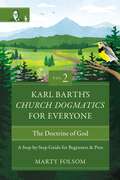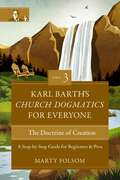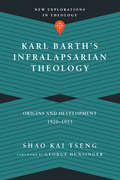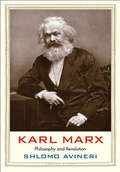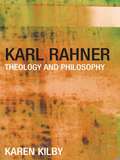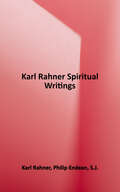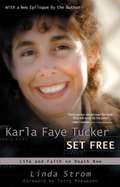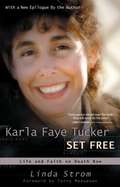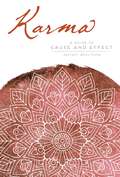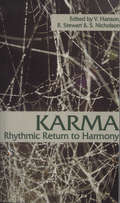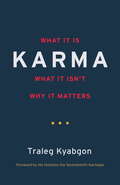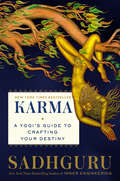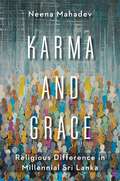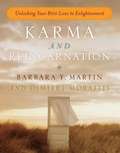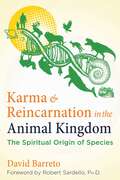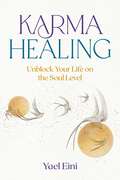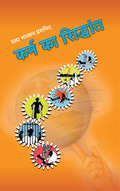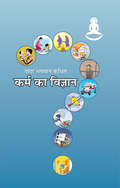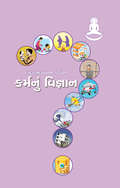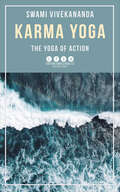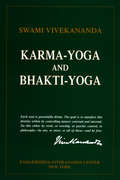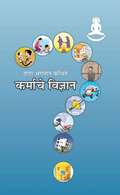- Table View
- List View
Karl Barth's Church Dogmatics for Everyone, Volume 2---The Doctrine of God: A Step-by-Step Guide for Beginners and Pros (Karl Barth’s Church Dogmatics for Everyone)
by Marty FolsomA Guided Tour of One of the Greatest Theological Works of the Twentieth CenturyKarl Barth's?Church Dogmatics?is considered by many to be the most important theological work of the twentieth century and for many people reading it, or at least understanding its contents and arguments, is a lifelong goal. Yet its enormous size, at over 12,000 pages (in English translations) and enough print volumes to fill an entire shelf, make reading it a daunting prospect for seasoned theologians and novices alike.Karl Barth's Church Dogmatics for Everyone, Volume 2--The Doctrine of God?helps bridge the gap for would-be Karl Barth readers from beginners to professionals by offering an introduction to Barth's theology and thought like no other. User-friendly and creative, this guide helps readers get the gist, significance, and relevance of what Barth intended for the church... to restore the focus of theology and revitalize the practices of the church.Each section contains insights for pastors, new theologians, professionals, and ordinary people including:Summaries of the sectionContextual considerationsAnd other visually informative features that reinforce the main points of the Barth's thoughtIn addition, each volume features the voices of authors from different academic disciplines who contribute brief reflections on the value of?Church Dogmatics?for creative discovery in their disciplines. Volume 2 reflections include:Chris Tilling (biblical studies)David Guretzki (systematic theology)Earl Palmer (pastors)Wyatt Houtz (ordinary people)Andrew Howie (mental health)James Houston (spiritual formation)Ross Hastings (science)Jeremy Begbie (the arts)Whether you are just discovering Barth or want a fresh look at his magnum opus, this series invites you to an enjoyable and insightful journey into the?Church Dogmatics.
Karl Barth's Church Dogmatics for Everyone, Volume 3---The Doctrine of Creation: A Step-by-Step Guide for Beginners and Pros (Karl Barth’s Church Dogmatics for Everyone)
by Marty FolsomKarl Barth's?Church Dogmatics?is considered by many to be the most important theological work of the twentieth century. For many people reading it, or at least understanding its contents and arguments, is a lifelong goal. Yet its enormous size, at over 12,000 pages (in English translations) and enough print volumes to fill an entire shelf, make reading it a daunting prospect for seasoned theologians and novices alike.Karl Barth's Church Dogmatics for Everyone, Volume 3 - The Doctrine of Creation?helps bridge the learning gap for would-be Karl Barth readers from beginners to professionals by offering an introduction to Barth's theology and thought like no other. User-friendly and creative, this guide helps readers get the gist, significance, and relevance of what Barth intended for the church - to restore the focus of theology and revitalize the practices of the church.Each section contains insights for pastors, new theologians, professionals, and ordinary people including:Summaries of the sectionContextual considerationsAnd other visually informative features that reinforce the main points of the Barth's thoughtIn addition, each volume features the voices of authors from different academic disciplines who contribute brief reflections on the value of?Church Dogmatics?for creative discovery in their disciplines. Volume 3 reflections include:Samuel Adams (Biblical Studies)Gary Deddo (Systematic Theology)Cherith Fee Nordling (Embodied Theology)Will Willimon (Pastors)Jeff McSwain (Ordinary People)Daniel J. Price (Mental Health)Geordie Ziegler (Spiritual Formation)Ross Lockhart (Missions)David McNutt (The Arts)Jonathan Lett (Science)Whether you are just discovering Barth or want a fresh look at his magnum opus, this series invites you to an enjoyable and insightful journey into the Church Dogmatics.
Karl Barth's Infralapsarian Theology: Origins and Development, 1920-1953 (New Explorations in Theology)
by Shao Kai TsengTheologians have long assumed that Karl Barth's doctrine of election is supralapsarian. Challenging decades of scholarship, Shao Kai Tseng argues that despite Barth's stated favor of supralapsarianism, his mature lapsarian theology is complex and dialectical, critically reappropriating both supra- and infralapsarian patterns of thinking. Barth can be described as basically infralapsarian because he sees the object of election as fallen humankind and understands the incarnation as God's act of taking on human nature in its condition of fallenness. Tseng shows that most of Barth's Reformed critics have not understood his doctrine of election accurately enough to recognize his affinity to infralapsarianism and, conversely, that most Barthians have not understood Reformed-orthodox formulations of election with sufficient accuracy in their disagreement with the tradition. Karl Barth's Infralapsarian Theology offers a clear understanding of both the historic Lapsarian Controversy and Barth's distinct form of lapsarianism, providing a charitable dialogue partner to aid mutual understanding between Barth and evangelicals.
Karl Marx: Philosophy and Revolution (Jewish Lives)
by Shlomo AvineriThis new exploration of Marx as a Jewish thinker presents “a perceptive and fair-minded corrective to superficial treatments” of his life and work (Jonathan Rose, Wall Street Journal).A philosopher, historian, sociologist, economist, current affairs journalist, and editor, Karl Marx was one of the most influential and revolutionary thinkers of modern history. But he is rarely thought of as a Jewish thinker, and his Jewish background is either overlooked or misrepresented. Here, distinguished scholar Shlomo Avineri argues that Marx’s Jewish origins made a significant impression on his work. Marx was born in Trier, then part of Prussia, and his family had enjoyed full emancipation under earlier French control of the area. But then its annexation to Prussia deprived the Jewish population of its equal rights. These developments led to the reluctant conversion of Marx’s father, and similar tribulations radicalized many other Jewish intellectuals of that time.Avineri puts Marx’s Jewish background in its proper and balanced perspective, and traces Marx’s intellectual development in light of the historical, intellectual, and political contexts in which he lived.
Karl Rahner: Theology and Philosophy (Spck Introductions Ser.)
by Karen KilbyKarl Rahner is one of the great theologians of the twentieth century, known for his systematic, foundationalist approach. This bold and original book explores the relationship between his theology and his philosophy, and argues for the possibility of a nonfoundationalist reading of Rahner. Karen Kilby calls into question both the admiration of Rahner's disciples for the overarching unity of his though, and the too easy dismissals of critics who object to his 'flawed philosophical staring point' or to his supposedly modern and liberal appeal to experience. Through a lucid and critical exposition of key texts including Spirit in the World and Hearer of the Word, and of themes such as the Vorgriff auf esse, the supernatural existential and the anonymous Christian, Karen Kilby reaffirms Rahner's significance for modern theology and offers a clear exposition of his thought.
Karl Rahner: Spiritual Writings (Modern Spiritual Masters Ser.)
by Karl RahnerKarl Rahner (1904-1984), a Jesuit priest, was one of the most influential Catholic theologians of the twentieth century. A major force at Vatican II, his writings effected a paradigm shift in modern theology. Yet it was the experience of prayer and a deeply mystical faith that animated and inspired his scholarly activity. <p><p>In the end, Rahner's message was simple and accessible: an appeal to recognize and appropriate God's self-gift, the mystery that Christianity calls grace - a reality that is at least latent in every human mind and heart." "This anthology shows that if Rahner was an important theologian, it was because he was more fundamentally a modern spiritual master.
Karla Faye Tucker Set Free: Life And Faith On Death Row
by Linda StromKarla Faye Tucker, the first woman executed in Texas in over one hundred years, became an evangelist for Christ during her fourteen-year imprisonment on Death Row. This is the story of Karla's spiritual journey, the women and men she reached, and the God who offers redemption and hope to the hardest of hearts.
Karla Faye Tucker Set Free: Life and Faith on Death Row
by Linda StromThis gripping story about the first woman executed in Texas in over one hundred years draws on accounts from family, prisoners, government officials, and friends to show how God used a remarkable woman to reach countless lives with a message of redemption and joy. Linda Strom, Tucker's spiritual advisor and close friend for eleven years, includes photographs as well as excerpts from Tucker's letters and interviews.From the Trade Paperback edition.
Karma: A Guide to Cause and Effect
by Jeffrey ArmstrongCombining the ancient wisdom of the Vedic tradition and the point of view of the modern spiritual seeker, Karma illustrates how to find meaning and purpose in a life that can at times feel random and out of control.In this compelling and in-depth introduction to the ancient Hindu concept of karma, spiritual teacher and award-winning author Jeffrey Armstrong explores reincarnation, the deeper mysteries of the soul, the laws of nature, and the ways in which cause and effect influence our lives. Moving beyond Western perceptions of science and luck, Armstrong explores the mystical balance of the universe. These long-secret laws of karma, excavated from the ancient wisdom of India, offer a means to deepen one&’s spiritual vision and reveal the profoundly interconnected nature of all that exists. The Mandala Wisdom Series is an introductory collection on Eastern wisdom and spirituality, providing readers with the tools to enhance their health and well-being.
Karma
by Virginia Hanson Rosemarie Stewart Shirley NicholsonThis popular anthology explores karma from many points of view, including Christianity, Judaism, Hindu yogic philosophy, and Buddhism. Essays by psychologists, scientists, and philosophers.
Karma: What It Is, What It Isn't, Why It Matters
by Traleg KyabgonThe Buddha's teaching on karma (literally, "action") is nothing other than his compassionate explanation of the way things are: our thoughts and actions determine our future, and therefore we ourselves are largely responsible for the way our lives unfold. Yet this supremely useful teaching is often ignored due to the misconceptions about it that abound in popular culture, especially oversimplifications that make it seem like something not to be taken seriously. Karma is not simple, as Traleg Kyabgon shows, and it's to be taken very seriously indeed. He cuts through the persistent illusions we cling to about karma to show what it really is--the mechanics of why we suffer and how we can make the suffering end. He explains how a realistic understanding of karma is indispensable to Buddhist practice, how it provides a foundation for a moral life, and how understanding it can have a transformative effect on the way we relate to our thoughts and feelings and to those around us.
Karma: A Yogi's Guide to Crafting Your Destiny
by Sadhguru&“Full of valuable insights to guide you.&”—WILL SMITH &“Thoughtful and life-affirming . . . a must-read.&”—TONY ROBBINS &“This book will put you back in charge of your own life.&”—TOM BRADY A new perspective on the overused and misunderstood concept of &“karma&” that offers the key to happiness and enlightenment, from the New York Times bestselling author and world-renowned spiritual master Sadhguru.What is karma? Most people understand karma as a balance sheet of good and bad deeds, virtues and sins. The mechanism that decrees that we cannot evade the consequences of our own actions. In reality, karma has nothing to do with reward and punishment. Karma simply means action: your action, your responsibility. It isn&’t some external system of crime and punishment, but an internal cycle generated by you. Accumulation of karma is determined only by your intention and the way you respond to what is happening to you. Over time, it&’s possible to become ensnared by your own unconscious patterns of behavior.In Karma, Sadhguru seeks to put you back in the driver&’s seat, turning you from a terror-struck passenger to a confident driver navigating the course of your own destiny. By living consciously and fully inhabiting each moment, you can free yourself from the cycle. Karma is an exploration and a manual, restoring our understanding of karma to its original potential for freedom and empowerment instead of a source of entanglement. Through Sadhguru&’s teachings, you will learn how to live intelligently and joyfully in a challenging world.
Karma
by Rosemarie Stewart Shirley J. Nicholson Virginia HansonThis popular anthology explores karma from many points of view, including Christianity, Judaism, Hindu yogic philosophy, and Buddhism. Essays by psychologists, scientists, and philosophers.
Karma and Grace: Religious Difference in Millennial Sri Lanka (Religion, Culture, and Public Life #46)
by Neena MahadevAround the turn of the millennium, Pentecostal churches began to pepper majority-Buddhist Sri Lanka, setting off a sense of alarm among Buddhists who saw Christianity as a neocolonial threat to the nation. Rumors of foul play in the death of a Buddhist monk, as well as allegations of proselytizing in the aftermath of the 2004 tsunami and during the final stages of civil war, spurred nationalist anxieties, moral panics, and even episodes of violence by Buddhists against Christians suspected of facilitating “unethical” conversions.Through vivid ethnography and keen observations of media events, Karma and Grace illuminates disputes over religious freedom and pluralism amid the rise of charismatic Christianity in Sri Lanka. Neena Mahadev explores the dueling efforts of Buddhist nationalists and Christian evangelists to reshape Sri Lanka’s religious, economic, and political landscapes. She considers theological and political impasses between Buddhism’s vast timescales of karma and Christians’ promises of the immediacy of their God’s salvific grace. While Christian missions spread “the Good News,” subsets of Buddhists produced bad press, sting operations, and disparaging media to impede born-again churches from taking root. In gripping detail, Mahadev recounts how modernist and traditionalist Theravāda Buddhists, Pentecostal newcomers, long-established Christian denominations, local deity and spirit cults, and the innovations of mavericks intermingle in a multireligious public sphere. Even amid trenchant conflicts, Karma and Grace demonstrates that social proximity between rivals is also conducive to religious experimentation and the ambiguities of identity that allow Sri Lankans to live with difference.
Karma and Reincarnation: Unlocking Your 800 Lives to Enlightenment
by Martin Barbara Y. Dimitri MoraitisA comprehensive, visionary guide to the karmic cycle and its role within our life-both the life we're living and the lives to come. There is life after death, and Barbara Martin has seen it. Now for the first time comes her inspired, firsthand account of the intricate world of spiritual rebirth. The award-winning authors of Change Your Aura, Change Your Life reveal the afterlife in a work based directly on Martin's personal explorations of the world to come and awe-inspiring clairvoyant experience with the spiritual world. Both a fully practical handbook to the ins and outs of the karmic cycle and a field guide to the spiritual plane and how reincarnation works, Karma and Reincarnation: -Brings together the design of the world beyond and the mechanics of karma; -Gives practical guidelines and tools to deal effectively with karmic situations and avoid generating adverse karma; -Helps align readers with their spiritual purpose; -Shows readers how to face and resolve their karmic troubles; and -Provides essential keys to spiritual development. A true spiritual wonder in a single, fully accessible volume, Karma and Reincarnation is perfect for both those taking their first steps down a spiritual path and longtime spiritual students.
Karma and Reincarnation in the Animal Kingdom: The Spiritual Origin of Species
by David BarretoInvestigates the spiritual anatomy and evolution of animals• Examines the anatomy of the spiritual bodies of animals, including their aura, etheric fields, chakras, and mental, astral, and buddhic bodies • Details how reincarnation and karma work in the animal kingdom, including how the way that animals die can have different effects on their spiritual bodies in the astral realms • Explores the spiritual, energetic, and psychic abilities of many animals and insects Where do the spirits of animals go after they die? Do animals have chakras or auras? Why were animals worshipped in ancient religions? Exploring these questions and more, David Barreto presents a deep investigation into the spiritual evolution of the animal kingdom, from ants and cockroaches to cats, dogs, owls, pigeons, dolphins, and whales. He examines the spiritual anatomy of animals, including their aura, etheric fields, chakras, and mental, astral, and buddhic bodies. Detailing how reincarnation works among various species, Barreto explores their experiences between physical lives, how they accrue karma, and how the way that animals die can have different effects on their spiritual bodies in the astral realms. Drawing on both modern physics and metaphysics, he reveals, for example, how dogs can love unconditionally because of their large electromagnetic field, which nourishes the etheric bodies of those around them, and how cats can detect subtle energy shifts and disharmonies and conduct etheric filtration while they sleep. Examining esoteric schools as well as ancient spiritual traditions around the world, the author explores how animals are viewed and worshipped in different religions and how animal adoration and animal-connected gods arose in ancient Egypt, India, and China. He looks at animal totems, animal archetypes, animals in alchemy, and the astral connections between animals and elementals. The author also examines the spiritual and energetic repercussions of meat consumption and animal sacrifice, revealing the astral and etheric components of slaughterhouses. Detailing the role of the animal kingdom in the Age of Aquarius, the author shows how, with the awakening of this new astrological era, animals will have their earthly lives elevated with lasting worth and dignity, equal to the love and respect they have been transmitting for millennia.
Karma Healing: Unblock Your Life on the Soul Level
by Yael Eini• Shares techniques to release past-life traumas, untie karmic knots, dissolve limiting beliefs, and rewrite soul contracts• Explains the soul path with the help of Karmic Constellation, combining elements of energy healing and family constellations• Explores the concepts of karma, soul lessons, and soul familiesAs much as we strive to create harmonious, peaceful lives, at times we simply do not understand why or where we take a different turn. Our soul, however, knows the way and guides us toward healing our karma on the soul level so that we may realign with our true purpose.Offering a deep dive into the intricate web of karmic patterns and soul lessons, this insightful guide explores the concept of karma and its profound impact on our present lives. A better understanding of deep-rooted issues will help you dissolve karmic knots, release past trauma, and rewrite soul contracts as you learn to identify and work through soul lessons, past life experiences, and reincarnation patterns. As you intuitively engage with soul systems and past lives in Karmic Constellation—a transformative tool combining elements of energy healing and family constellation—you not only heal but also recognize how you grow through your experiences.With guidance, transformative practices, and inspiring case studies, this essential guide provides everything you need to heal yourself and your soul to bring love, contentment, and freedom back into your life.
Karma Ka Siddhant: कर्म का सिद्धांत
by Dada Bhagwan'मैंने किया' बोला कि कर्मबंध हो जाता है। ये 'मैंने किया' इसमें इगोइज़्म(अहंकार) है और इगोइज़्म से कर्म बंधा जाता है। जिधर इगोइज़्म ही नहीं, मैंने किया ही नहीं है, वहाँ कर्म नहीं होता है ।
Karma Ka Vignan: कर्म का विज्ञान
by Dada Bhagwanजब भी हमारे साथ कुछ भी अच्छा या बुरा होता है तो हम हमेशा यही कहते हैं कि – यह सब हमारे कर्मो का ही नतीजा है| पर क्या हम जानते है कि कर्म क्या है और कर्म बंधन कैसा होता है? दादाश्री कहते है कि हमारा सारा जीवन हमारे ही पिछले कर्मो का नतीजा है| जो कुछ भी हमारे साथ अच्छा या बुरा हो रहा हैं, इसके ज़िम्मेदार हम खुद ही है| इस जीवन के कर्मो के बीज तो हमारे पिछले जन्मो में ही पड़ गए थे और अभी हम जो कुछ भी कर रहे है वह सब अगले जन्मों में रूपक में आएगा| लोग अक्सर यही सोचते है कि अच्छे कर्म और बुरे कर्म क्या होते है और किस प्रकार हम कर्म बंधन से मुक्त हो सकते है? दादाजी इसका जवाब देते हुए कहते है कि जिस काम से किसी का भला हो उसे अच्छे कर्म कहते है और जिससे किसी का नुक्सान हो, तो, उसे बुरे कर्म कहते है| कर्म बंधन से मुक्त होने का सबसे आसान और सरल उपाय यही है कि हम नए कर्मो के बीज ना डाले और अभी जो कुछ भी हो रहा है उसको समता से और समभाव से पूरा करे| ऐसा करने से नए कर्मो के बीज नहीं पड़ेंगे और हम इस जन्म-मरण के चक्कर से मुक्त हो पाएँगे| कर्म का विज्ञान और उसे चलाने वाली व्यवस्थित शक्ति के बारे में अधिक जानकारी प्राप्त करने, ‘कर्म का विज्ञान’, यह किताब ज़रूर पढ़े और अपने जीवन को सुखमय बनाये|
Karma Nu Vignan: કર્મનું વિજ્ઞાન
by Dada Bhagwanકર્મ શું છે? શું સારા કર્મો ખરાબ કર્મોને ધોઈ શકે? શા માટે સારા માણસો દુઃખી થાય છે? કર્મો બંધાતા કેમ રોકી શકાય? શરીર કે આત્મા, કર્મોથી કોણ બંધાયેલું છે? આપણા કર્મો પુરા થાય છે ત્યારે શું આપણું મૃત્યુ થાય છે? આખું જગત કર્મના સિદ્ધાંત સિવાય બીજું કંઈ નથી. બંધનનું અસ્તિત્વ પૂર્ણપણે તમારા ઉપર નિર્ભર છે, તમે પોતે જ તેના માટે જવાબદાર છો. બધું જ તમારું આલેખન છે. તમે તમારા શરીરના બંધારણ માટે પણ જવાબદાર છો. તમારી સામે જે આવે છે એ બધું તમારું જ ચીતરેલું છે; બીજું કોઈ એને માટે જવાબદાર નથી. અનંત જન્મો માટે તમે જ “ સંપૂર્ણપણે અને એકલા “ જવાબદાર છો.- પરમ પૂજ્ય દાદાશ્રી કર્મોના બીજ ગયા ભવમાં નંખાયા હતા તેના ફળો આ ભવમાં મળે છે. આ કર્મોના ફળ કોણ આપે છે? ભગવાન? ના. તે કુદરત અથવા ‘વ્યસ્થિત શક્તિ’ (સાયન્ટીફીક સરકમસ્ટેન્સીયલ એવીડન્સ) કહેવાય છે તે આપે છે. પરમ પૂજ્ય દાદાશ્રીએ, પોતાના જ્ઞાન વડે કર્મોનું વિજ્ઞાન જેમ છે તેમ ખુલ્લું કર્યું છે. અજ્ઞાનને કારણે, કર્મો ભોગવતી વખતે રાગ – દ્વેષ થાય છે, તેથી નવા કર્મો બંધાય છે જે પછીના ભવમાં પાકે છે અને તે ભોગવવા પડે છે. જ્ઞાનીઓ નવા કર્મો બંધાતા અટકાવે છે. જયારે બધા કર્મો પુરેપુરા ખલાસ થાય છે ત્યારે છેવટનો મોક્ષ થાય છે.
The Karma of Questions: Essays on the Buddhist Path
by Thanissaro BhikkhuThe 12 essays in this book are an attempt to follow the Buddha's example in approaching questions, trying to trace back to the questions that molded his teaching, and resisting the temptation to focus on questions that would force those teachings into a different shape.
The Karma of Questions: Essays on the Buddhist Path
by Thanissaro BhikkhuThe essays in this book are an attempt to follow the Buddha's example in approaching questions, trying to trace back to the questions that molded his teachings, and resisting the temptation to focus on questions that would force those teachings into a different shape.
Karma Yoga: The Yoga of Action
by Swami VivekanandaIn this short collection of lectures, influential Hindu monk Swami Vivekananda explains Karma Yoga, one of the several yogic paths to enlightenment. By working to carry out ones duties to the world at large but simultaneously giving up attachment to that work, we can obtain spiritual liberation. Let Swami Vivekananda's words inspire you to lead a life of purpose, selflessness, and profound fulfillment!
Karma-Yoga and Bhakti-Yoga
by Swami Nikhilananda Swami VivekanandaKARMA-YOGA AND BHAKTI-YOGA describes the method of reaching perfection through daily work and of sublimating human affection into divine love.
Karmache Vidnyan: कर्माचे विज्ञान
by Dada Bhagwanकर्म काय आहे? कशा प्रकारे कर्म बांधले जाते? चांगल्या कर्मांनी वाईट कर्म धूतली जातात का? चांगली माणसं दु:खी का होत असतात? कर्म बांधणे थांबवायचे कसे? कर्मांमुळे बंधनात कोण आहे, शरीर की आत्मा? आपली कर्म संपतात तेव्हा आपला मृत्यु होतो का? संपूर्ण जग कर्माच्या सिद्धांताशिवाय दुसरे काहीच नाही. बंधनाचे अस्तित्व हे पूर्णपणे तुमच्यावरच अवलंबून आहे, तुम्ही स्वत:च त्यासाठी जबाबदार आहात. सर्वकाही तुमचेच आलेखन आहे. तुमच्या शरीराच्या बांधणीसाठी सुद्धा तुम्ही स्वत:च जबाबदार आहात. तुमच्या समोर जे येत आहे ते सर्व तुम्हीच रेखाटलेले आहे, इतर कोणीही त्यास जबाबदार नाहीच. अनंत जन्मांसाठी मात्र तुम्हीच ‘‘संपूर्णपणे आणि एकटेच जबाबदार आहात’’-परम पूज्य दादाश्री. कर्मांची बीजं मागच्या जन्मी टाकलेली होती त्याची फळे ह्या जन्मात मिळतात. तर ही कर्माची फळे देतो कोण? ईश्वर? नाही, त्यास निसर्ग किंवा व्यवस्थित शक्ति (सायन्टिफिक सरकमस्टेन्शियल एविडेन्स) म्हटले जाते, ती देत असते. परम पूज्य दादाश्रींनी स्वत:च्या ज्ञानाद्वारे कर्माचे विज्ञान जसे आहे तसे उघड केले आहे. अज्ञानतेमुळे कर्म भोगत असताना राग-द्वेष होतात जेणे करुन नवीन कर्म बांधली जातात, जी मग पुढच्या जन्मी परिपक्व होतात आणि ती भोगावी लागतात. ज्ञानी नवीन कर्म बांधायचे थांबवतात. जेव्हा सर्व कर्म संपूर्णपणे संपतात तेव्हा अंतिम मोक्ष होतो.
